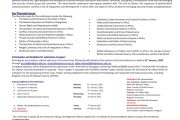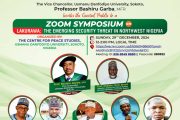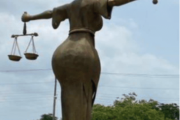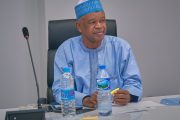President Muhammadu Buhari is now saying that the killings that have been going on especially across Benue, Taraba states, Southern and Northern, (Birnin Gwari) Kaduna in Kaduna State and Zamfara State and the associated general atmosphere of insecurity has an agenda of instigating war in Nigeria rather than being spontaneous acts. He has put the killings to “subterranean forces with a sinister agenda to instigate war in the country for selfish purposes” rather than anything spontaneous.
There are those who consider these words great and even soothing but who say they have been waiting to hear such words from the president’s mouth but to no avail. Hence the question of when the president came to this conclusion. Ever since or recently? Can it be recently?
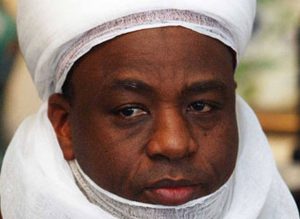
Alhaji Sa’ad Abubakar 111, the Sultan of Sokoto
Ahead of a meeting of the governors of the states in the North along with traditional rulers and select civil society organisations in January 2017 shortly after the killings in Southern Kaduna, Intervention, for instance, flashed an Editorial opinion January 17th, 2017 titled “Can Northern Behemoth Rescue the North From Itself at This Meeting?” It said inter alia:
“Going by the origin of upheavals in Nigeria, history does offer a clue. The pressure of slave trade in Africa became more intensified by outsiders, East and West, just as the war to abolish it also came largely from outside. That is the same with colonialism and neo-colonialism. Even the struggle for independence was triggered from outside in so far as the world wars contributed to undermining the ideology of racial superiority which sustained colonialism. The Cold War which was largely operationalised in Africa has external origin just as the structural adjustment which created the material and psychic disorientation being resolved in the numerous violent ethno-religious and regional sparks today across Nigeria and much of Africa. That is also the story of 9/11 and the subsequent ‘Global War on Terror’ coinciding with the rise of China and the troubling prospects about that in Africa. Can the current spate of violence in Nigeria, therefore, be understood outside of the global geopolitics?
Shortly after, extracts from the article, “The Rise, Fall and Rise Again of Boko Haram”which Harvard International Review published had the writer stating, among others:
“The birth and growth of Boko Haram was—and has been—shaped by a combination of covert foreign interference, poor governance, corruption, infrastructure neglect, extreme poverty, and the rapid rise of a fundamentalist Wahhabi theological system that opposes the generally tolerant Islam practiced by the traditional northern Nigerian establishment”.
What this means is that the president must have known all along, if not through his own intelligence system, then through these sorts of writings about this interpretation of the emerging type of violence as something organised rather than spontaneous. One of the punishing aspects of being a president is having to read all sorts of published materials, including those the president might ordinarily even close down if he has his way.
But the country was greeted with presidential silence. The Presidency even argued in December 2016 that the president did not have to talk. That was in response to public reservations against presidential silence in the aftermath of the initial killings in Kaduna.
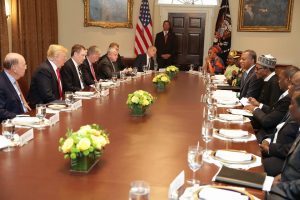
The US and Nigeria at a recent bilateral session
Without the president or the particular meeting of the northern leadership saying anything categorical, the atmosphere was created for all manner of interpretations and standpoints to fester and compete for attention. Although the Sultan of Sokoto kept saying that the killers have nothing to do with a Fulani agenda, presidential silence appeared to undermine his position sink. Things reached a point where it became impossible to argue against contending claims that had gained ground, particularly the perception that the killings have an Islamisation agenda. That view is so strong now even in the most educated or informed quarters. Even Donald Trump, sitting president of the United States is asking the Nigerian president to stop the killing of Christians, the implications of which must worry all, especially with former President Obasanjo adding that the incumbent can hardly do anything about the killings.
So, why did the president allow this to happen? Supposing he spoke out immediately, made a broadcast, used authority effectively, declared an emergency of some sort on the subterranean forces he is now talking about and was seen to be above board? Would the country be where it is now? How would he convince people of the truth of his own standpoint now? How wouldn’t people link his own standpoint now to his own campaign for 2019 since he had kept quiet for much of the time? Are these ‘natural’ or professional subterranean forces or subterranean forces that he might have, consciously or otherwise, triggered into action?
Is it securitisation of the subterranean forces and its offensive-defensive implications that can bring the current situation down or the option of an urgent widening of the inter-discursive space? How would a securitising strategy prevent the war that the president argue to be the hidden agenda of the subterranean forces without mobilising a national consensus? Certainly, a sitting president can easily bring into being an inter-discursive space. It doesn’t have to be another costly National Conference but it should be clear that the only way to produce peace at a time like this is not by creating more battalions but widening the inter-subjective space or doing both. Not only has there been further fragmentation of the power elite, the framing of the state of the nation in popular imagination embody signals that can easily overstretch national security. These two signals are enough grounds for a shift from experts with plastic concepts of peacemaking and conflict management to the imperatives of discourse and conflict.








